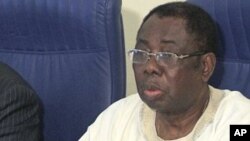Top security officials in six West African countries are scheduled to meet in the Liberia capital, Monrovia Tuesday.
The security officials, who include the Chiefs of Defense Staff and Police, have been tasked by the Economic Community of West African States (ECOWAS), to assess the security situation there, ahead of the October general elections.
Ambassador James Victor Gbeho, president of the Economic Community of West African States (ECOWAS) commission, said his group is coordinating with Liberia’s electoral body to ensure a free and fair vote.
His comments come as the heads of state of Burkina Faso, Ivory Coast, Ghana, Liberia, Nigeria and Senegal met in a mini-summit last week in Nigeria’s capital, Abuja.
The leaders expressed concern about the security situation “along the corridor between the two member states and within Liberia, characterized by criminal activities of non-state armed groups, by the presence and circulation of small arms and light weapons and by the plight of refugees, returnees and internally-displaced persons.”
“[They] looked at the situation, and they have prescribed that ECOWAS should cooperate even closer with the United Nations in securing the safety of Liberia, particularly during the election period,” said Gbeho.
He also said the heads of state will this week meet with the UN Secretary General Ban Ki Moon to request for more technical assistance and cooperation.
Gbeho expressed confidence the officials will assess the security situation in Liberia before the October 11 elections.
The heads of state also resolved to create a peaceful environment to ensure a successful vote. The leaders declared zero tolerance for any attempt to undermine free and fair elections in Liberia.
Some observers have expressed concern the leaders’ statement leaves little room for the Liberia opposition to express their grievances over the October vote, an assertion with which Gbeho sharply disagrees.
“Those responsible for the leadership of this region of Africa know very well what threats there can be to the electoral process in countries like Liberia, where there is a lot of incitement from contenders and their followers and attempts to derail the whole process,” said Gbeho. “As for the refusal to accept the outcome this unfortunately is becoming a habit, and that’s why the heads [of states] reacted so strongly.”
Gbeho also said he has dispatched officials of the ECOWAS to help Liberia’s electoral body to organize a credible vote.
He also said the leaders want to ensure the recent conflict in neighboring Ivory Coast doesn’t negatively impact next month’s vote in Liberia.




